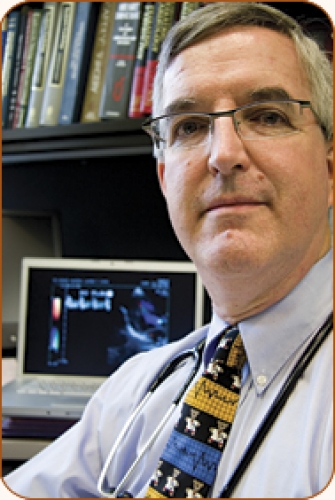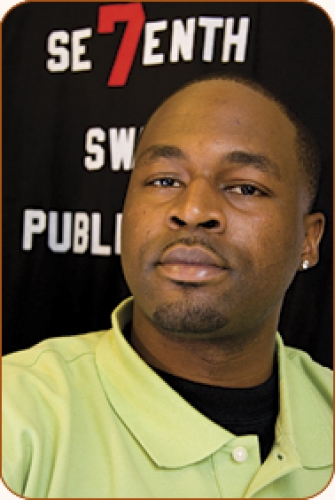Conjure a new idea, start a business, and make that business fly—easier dreamt than done. So Carolina business school professors Randy Myer and Ted Zoller created a course called “Launching the Venture” to help students, staff, and faculty navigate our dog-eat-dog economy.
About one hundred entrepreneurs apply for the course each year, and one-third of them are accepted into the half-semester class where participants conduct market research to vet their own ventures. Then they defend their findings before judges—usually industry people Myer and Zoller bring in. Last year, thirteen ventures passed the test and were invited to take another half-semester class on cranking up a successful company. Five were focused on science and technology, four were service- and retail-oriented, and four were focused on publishing and social activism.
The Office of Technology Development co-sponsors the Launching the Venture course. Its main goal is to help inventors license discoveries, secure financial support from corporate sponsors, provide patent assistance, and negotiate agreements with interested companies.
The business of activism
The caption of an online world map read: each time a country changes color, another person dies from hunger. Sindura Citenini watched one country change color. Then another. Then India, her homeland, faded to black.
“When I saw this map and pictured all these people, it was almost like I could feel the pain,” she says. First she wept. Then she started Hunger Lunch, a UNC-based nonprofit that sells rice-and-beans meals on campus several times a year—a model that was inspired by former UNC medical student Kelly Fogleman. Citineni raised seventy-five hundred dollars for the largest slum in her hometown of Hyderabad, where she then sought advice at India’s National Institute of Nutrition, modified a special nutritional beverage, and worked with community leaders, cooks, and aid organizations to feed one hundred and fifty malnourished children for four years.
She was successful, but working with so many disparate groups nearly overwhelmed the nineteen-year-old undergrad. She came back to Carolina and created Nourish International (NI), a nonprofit group of Carolina students that organizes campus Hunger Lunches, poker tournaments, and dance events to raise money for sustainable projects around the world.
Citineni wanted to take it to the next level. “But we had no marketing analysis, no financial analysis,” she says. “We were a just a bunch of students sitting around talking.”
Citineni, along with NI members Joel Thomas and Brian Zandt, took “Launching the Venture” to help them develop a detailed business plan and set clear ground rules: NI must work with a grassroots aid organization with long-standing ties to an impoverished community; projects must be sustainable; NI members must consult with indigenous community members; there must be tangible results; and aid groups must allow Carolina students to work on location each summer.
This summer, NI helped develop sustainable gardens in Argentina and a fruit orchard on the outskirts of Bombay. Duke, N.C. State, and the University of Nebraska at Omaha started NI chapters as mini-ventures with help from UNC-Chapel Hill’s chapter.
Citineni, now attending Carolina’s dental school, wants more than three hundred college chapters open in five years. Ambitious—but according to the business plan, that estimate might be conservative.
Downloading the heart
James Loehr founded iCardiogram to allow heart specialists to download echocardiogram images, interpret them, and advise a patient’s doctor immediately. Photo: Jason Smith
What if you need an ultrasound of your heart, but there’s no specialist in town able to interpret the echocardiogram? Your doctor might make a video, and then mail it to a cardiologist. These days, your doctor could schedule a video conference call with a specialist.
“Or they just won’t do the ultrasound, and instead send you to UNC Hospital unnecessarily,” says pediatric cardiologist James Loehr. His company iCardiogram developed technology to change all that. It’s called an EchoEncoder, essentially a laptop and special software Loehr and company co-founder David Reaugh devised to let doctors upload analog and digital echocardiograms to a server in Raleigh so that heart specialists anywhere in the world can download and interpret the data and immediately advise other doctors.
“This is the general advantage of videoconferencing,” Loehr says. “But with video conferencing, if I knew a video was coming in, I’d have to drive to the hospital at a scheduled time. With iCardiogram, I can read the echo at home or on any computer that has QuickTime software.”
Loehr also says that iCardiogram’s image quality is superior to video conferencing and that it’s less expensive.
But the key difference is the quickness. Even in Baghdad, doctors have used iCardiogram to diagnose children who needed immediate surgery. Loehr says that aid organizations in the Dominican Republic also use the technology.
iCardiogram started four years ago with one client in Nevada. Today, Loehr says, between seven hundred and one thousand echocardiograms are transferred through the company’s server each month. Pretty good for a couple of guys with no business background. “Launching the Venture,” Loehr says, helped him refine his financials and make contacts in the business world.
An educational identity
Andre Wesson developed Seventh Swan to publish children’s books, DVDs, and audio material for minority kids. Photo: Jason Smith
Remember the story of the ugly duckling? Andre Wesson saw the metaphor play out while teaching at an elementary school—some kids might be seen as ugly ducklings but they should all become swans. Wesson saw that too many minority kids didn’t understand their own history and culture. They thought they were just different.
“And I think this lack of identity leads to a lack of motivation to pursue positive things into the future,” he says.
This ideal and a little research into the $35 billion publishing industry led Wesson to form Seventh Swan Publishing, which will produce educational and historical books, CDs, and DVDs for African American and Hispanic children ages three to ten.
“When I started thinking about this, I wondered how many times as a kid I saw a face similar to mine in a book,” Wesson says.
Wesson, now an academic advisor at Carolina, wrote two series of children’s books based on his teaching experience in a multicultural classroom. The books cover material—the alphabet, numbers, etc.—that the state says young children must learn.
He searched for a publisher and found that less than 2 percent of publishing houses produce any kind of educational material for minority youth. Yet he found that 71 percent of minority parents polled wanted more literature geared toward their children. And when he told friends, coworkers, and family what he was up to, a network of customers appeared. He took twenty-five hundred preorders for his books in just three months.
“That led me to believe that this project was much more than a book,” he says.
Wesson created Seventh Swan, and then heard about “Launching the Venture.” He submitted a business plan based on his research and a vision for empowering kids to think creatively and passionately about their lives. By course’s end, he’d earned the coach’s award for most improved venture.
Seventh Swan’s initial focus is on North Carolina, but Wesson will soon reach out to leaders in academia, government, business, the community, and religious organizations in neighboring states.






